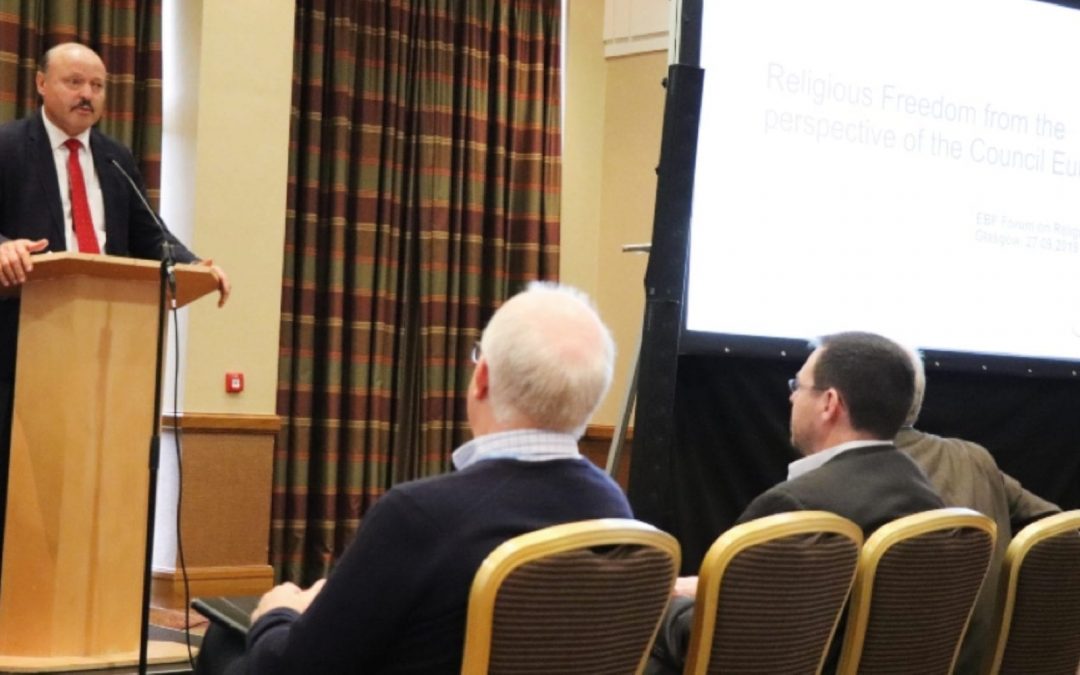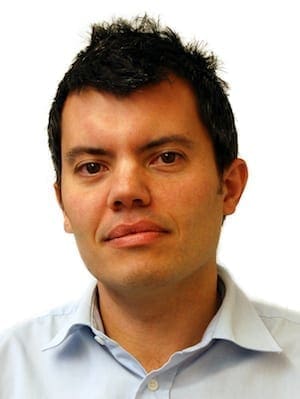Freedom of religion or belief was a key theme at the 2019 council of the European Baptist Federation (EBF), which also highlighted “impulses of hope” across the region.
Many members of the EBF are based in countries that impose restrictions on religious freedom; this was reflected at the latest council, where two sessions and seminars were devoted to the issue.
Members heard directly from Baptists in affected countries including Iraq, Serbia, Bulgaria and Ukraine as well as from Baptist politicians involved in enacting legislation.
Baptist World Alliance General Secretary Elijah Brown, a long-time religious freedom campaigner, brought a global perspective.
The council concluded with a new resolution on freedom of religion or belief, which emphasized how this is a continuing concern; this was the fifth resolution on the subject in 12 years, and the fourth in the last three.
The resolutions help member unions strengthen their advocacy work. EBF General Secretary Tony Peck encouraged all Baptists to draw from their shared heritage and campaign on the issue.
“We Baptists follow Thomas Helwys in advocating freedom of religion for all; we have a great contribution to make,” Peck said. He added that it is surprising how sometimes “we discover hope in Christ strongest among those who are suffering for their faith.”
A further resolution on climate change was issued at the end of the gathering, which took place in Glasgow, Scotland, in the 150th anniversary year of the Baptist Union of Scotland.
A record number of delegates – around 170 from more than 40 unions – gathered to discuss the work of the EBF, whose region also encompasses the Middle East and Central Asia as well as Europe.
This year’s council also saw the induction of new EBF President Meego Remmel from Estonia, who succeeds British Baptist minister Jenni Entrican after her two-year term ended.
It also marked the end of the first Transform, the EBF’s younger leaders’ program; six men and five women participated in the two-year program, which offered growth in Christian discipleship, character and leadership skills in an international setting.
There are several ways Baptists are bringing the hope of the gospel to a troubled region – and Peck’s message to those in attendance was that God is calling them to further develop these impulses of hope.
We are living in a period of “polarization and fragmentation” across our political landscape, Peck told delegates in his opening address.
We also continue to be challenged by issues of migration across Europe, where the reluctance to welcome the migrant, refugee and asylum-seeker has fueled “a nationalistic rhetoric of exclusivism that reminds some commentators of the build up to the dark days of the 1930s and 1940s.”
Conflict in the Middle East continues, and peace there is “always fragile,” he said.
Peck said he drew attention to these features of our region “not to deliberately paint a gloomy picture” but to remind us that “this is the context in which we live and seek to witness to our faith in the risen Lord Jesus Christ who has overcome the worst that evil can do.”
Baptists are bringing the hope of the gospel to the region, he said, outlining six “impulses of hope” that he believes they are making.
Though not an exhaustive list, these are things that are happening already “that perhaps God is calling us to develop further.”
- A renewed emphasis on lifelong discipleship.
In some of our unions and member churches, there is a renewed emphasis on forming lifelong disciples, Peck said. We should never stop being learning disciples “because that is what the word means.”
- A renewed willingness to be risk-takers for the sake of the gospel.
God is continuing to call us onward to “take the unchanging gospel of Jesus Christ into a changing context.”
And for some, that means thinking outside the box of the institutional church, encouraging those whom we sometimes call pioneers to engage in new frontiers for the gospel and gospel mission.
- A renewed concern to truly love the stranger and our neighbor.
“I have seen the results of what happens when God’s people truly reach out in love to the stranger and the refugee,” said Peck, citing examples in Lebanon and Vienna, Austria. “Such a reflection of God’s love imprints itself on the minds of those who are vulnerable and homeless and, in many cases, speaks to them of a God who loves them and a Savior who can be theirs.”
- A renewed commitment to peace and reconciliation in place of conflict.
“Whenever I travel to the Middle East,” Peck said, “I am struck by the efforts made by Baptists and other believers to stand in the gap between opposing violence and hatreds, and unequivocally follow Jesus in advocating for peace and nonviolence as part of their witness.”
- A renewed concern to be good stewards of God’s creation in which he has set us.
“Surely we of all people should be at the forefront of concern about what is happening to our planet and be first among those who argue for its responsible stewardship and the careful use of its resources,” Peck said.
(The 2019 EBF resolution on climate change is available here.)
- A renewed confidence and hope in God.
Our “greatest challenge” is to retain our hope and confidence in the living God “when sometimes the signs seem to be to the contrary,” Peck said.
He said Baptists bring the hope of the gospel to those two words, polarization and fragmentation, which characterize so much of our region of Europe and the Middle East today. Let us not get caught up with lesser that might distract us, he said.
Citing Romans 5, Peck concluded, “By God’s grace, may we be a people of hope.”
A two-part forum on religious freedom took place during the council. The first featured addresses from Baptists involved in advocacy on the issue.
Valeriu Ghiletchi, a recent member of the Moldovan Parliament and of the Parliamentary Assembly of the Council of Europe in Strasbourg, gave an insight into his involvement in six Council of Europe resolutions, three of which related to freedom of religion.
During one, he gave an account of the “humiliating” restrictions he had endured growing up in the Soviet era – a personal testimony that swung a tight vote.
Freedom of religion is “a complex issue that affects us all,” Ghiletchi said. While governments don’t always listen, he said, “I believe these resolutions from the Council of Europe are important.”
John Mason, a member of the Scottish Parliament and a former Westminster member of parliament, addressed the forum.
He is a member of Easterhouse Baptist Church and chairs the Cross-Party Group on Freedom of Religion or Belief.
Mason had firsthand experience of religious freedom restrictions while serving as a mission worker in Nepal in the 1980s.
The Cross-Party Group meets four times a year and focuses on different faith groups.
Recently, it had written to the Pakistan ambassador about treatment of Christians in Pakistan and to the BBC about its representation on Radio 4.
Mason said one of his hopes was to see a closer working together of Christian groups in this field.
Elijah Brown also addressed the panel. He is a specialist in human rights and religious liberty, who helped launch the 21st Century Wilberforce Initiative, a religious liberty advocacy agency; he later became its executive vice president and CEO.
Religiously motivated discrimination and harassment were on the increase for all faiths, he said. “The trend is quite clear.”
One aspect of this growth centered around “the intersection of technology and human rights and personal identity.”
Brown gave examples of how technology had been used to restrict Baptists; one pastor in the EBF region was fined after posting an invitation to an Easter service.
There were positive implications and negative ramifications about technology, he said. It is here to stay, but it needs more Christians to highlight ethical concerns; otherwise the “Googles and the Facebooks” will be setting the ethical parameters.
Brown also spoke of a new area of research that suggests that the more a country restricts religious freedom, the more it is working against its economic interest of its own country.
Each church has a social and economic footprint, he argued. If you give decision-makers information about this social and economic impact, it will “allow them to articulate policies that further religious freedom.”
The second part of the forum allowed members who are living in countries that restrict freedom of religion to share their stories.
Testimonies were shared from Ukraine (in the eastern, occupied territories), Serbia, Bulgaria and Iraq.
Christer Daelender, who has long led the EBF’s ministry in this area, spoke of the importance of international relations with those whose freedoms are restricted.
Daelender is stepping away from this work and received a standing ovation. Peck said he had been a pioneer, who “really helped us to up our game on religious freedom.”
The EBF also works to train local leaders as well as contacting national authorities to advocate for minorities.
Not tied to a legal system, the EBF also offers a “diplomatic voice,” said Kieryn Wurts, the EBF research assistant in freedom of religion and belief.
The EBF has in recent years filed reports on Kyrgyzstan, Turkey and Egypt and has representation on the United Nations.
“We keep running into the same anxiety: Where did democracy go? There is much concern for human rights,” she said. “We need to stand up at local, national and international (levels) – and speak with clarity: freedom of religion and belief for all.”
The EBF released a new resolution on freedom of religion and belief, building on its resolutions of recent years. Shayla Merivale, minister of Wincanton Baptist Church, chaired the resolutions committee.
Editor’s note: A version of this news story first appeared in The Baptist Times, the online newspaper of the Baptist Union of Great Britain. It is used with permission.
Paul Hobson is editor of The Baptist Times of Great Britain, the online newspaper of the Baptist Union of Great Britain.


